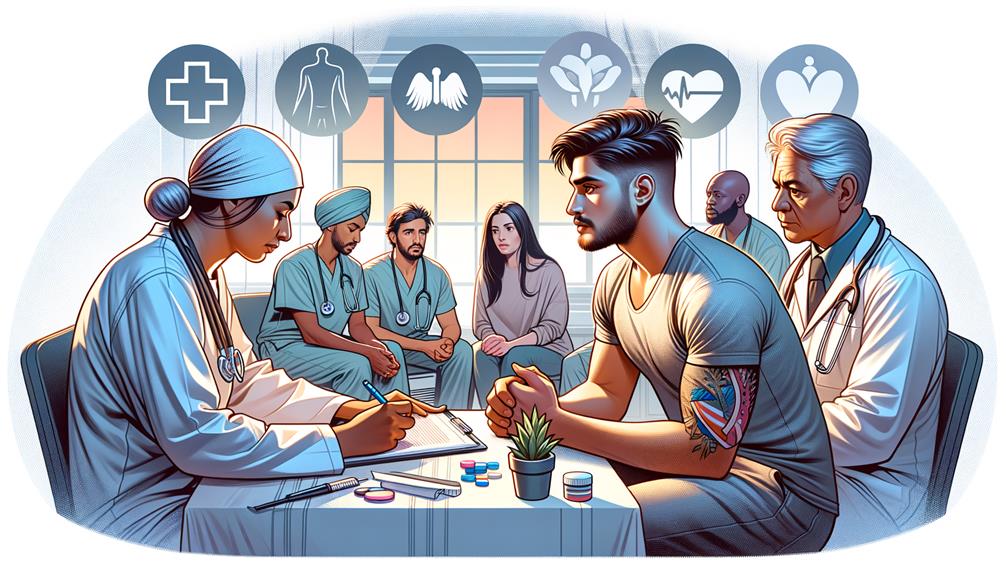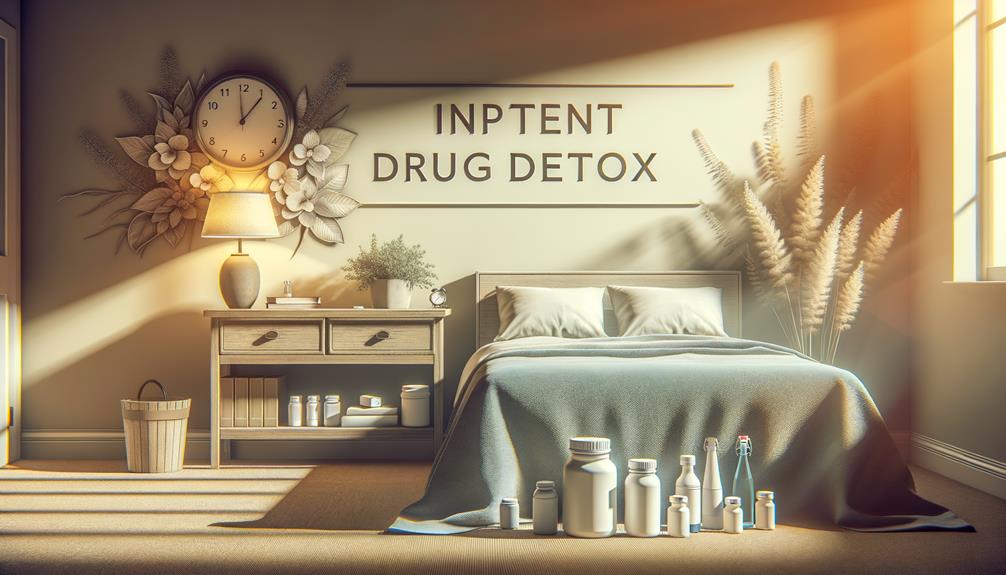Imagine embarking on a journey where each step brings you closer to a brighter, healthier future. Picture this: like a seed planted in fertile soil, undergoing a 6-month inpatient drug detox program offers you the opportunity to nurture your own growth and healing.
But what lies beyond the initial stage of detoxification? How does this extended treatment plan shape your path to recovery?
Benefits of 6-Month Inpatient Detox

For individuals struggling with severe substance abuse, a 6-month inpatient detox program offers comprehensive care and support to facilitate lasting recovery. The long-term benefits of committing to this program extend far beyond just detoxing your body from harmful substances.
During your sobriety journey, you'll experience personal growth that will positively impact your mental health. The structured environment of an inpatient facility provides a safe space for you to focus on healing and rebuilding your life.
Through therapy, counseling, and support groups, you'll gain valuable insights and coping strategies to navigate challenges post-treatment. Embracing this opportunity for transformation can lead to a healthier, more fulfilling life free from the grips of addiction.
Types of Therapies Offered
As you embark on this crucial journey towards healing and recovery, rest assured that a variety of therapeutic options awaits you. From individual counseling sessions tailored to address your specific needs to the camaraderie and support found in group therapy sessions, you'll have a range of tools at your disposal.
Additionally, holistic treatment approaches that encompass your mind, body, and spirit will be integrated to provide a comprehensive and personalized healing experience.
Individual Counseling Sessions
Consider exploring the various types of therapies offered during individual counseling sessions to find the approach that best suits your needs and journey towards recovery. Individual counseling sessions can be tailored to promote personal growth and emotional healing.
Therapies such as cognitive-behavioral therapy (CBT) focus on identifying and changing negative thought patterns and behaviors. Dialectical behavior therapy (DBT) helps in regulating emotions and improving relationships. Eye Movement Desensitization and Reprocessing (EMDR) is beneficial for processing trauma. Psychodynamic therapy delves into unconscious patterns and past experiences. Mindfulness-based therapy encourages living in the present moment.
Group Therapy Sessions
Explore the diverse range of therapeutic approaches offered in group therapy sessions to enhance your journey towards recovery and personal growth.
During these sessions, you may engage in art therapy to creatively express your emotions and experiences, fostering introspection and healing.
Mindfulness techniques will help you stay present and develop awareness of your thoughts and feelings without judgment, promoting self-compassion and stress reduction.
Additionally, cognitive behavioral therapy can assist in identifying and changing negative thought patterns and behaviors, empowering you to make healthier choices.
Experiential therapies like role-playing and group activities offer hands-on experiences to practice new skills and build connections with others in a supportive environment.
Embrace these valuable tools to cultivate lasting positive changes on your path to recovery.
Holistic Treatment Approaches
To further enrich your recovery journey, our inpatient drug detox program offers a range of holistic treatment approaches tailored to address your physical, emotional, and spiritual well-being. Embracing the mind-body connection is vital in promoting healing and growth.
Here are some of the alternative treatments we provide:
- Yoga and Meditation Sessions: Cultivate inner peace and mindfulness to support your journey towards sobriety.
- Acupuncture Therapy: Restore balance to your body's energy flow and alleviate withdrawal symptoms.
- Nutritional Counseling: Nourish your body with wholesome foods to support overall health and recovery.
These holistic approaches are designed to complement traditional therapies and provide you with a comprehensive treatment plan that caters to your individual needs.
Challenges Faced During Treatment
Navigating through the challenges during the 6 Month Inpatient Drug Detox program can be a daunting yet transformative experience for individuals seeking recovery. Family support plays a crucial role in this journey, but it may also bring up past conflicts and triggers. Finding healthy ways to communicate and rebuild relationships is key for long-term sobriety.
Additionally, focusing on relapse prevention strategies is essential to stay on track. The program also addresses mental health issues, emphasizing the development of coping skills to manage stress and emotional triggers without resorting to substances.
It's normal to face setbacks, but remember, each challenge overcome is a step closer to a healthier, drug-free life. Stay committed and trust the process.
Importance of Aftercare Planning

Planning for aftercare is a vital component of your journey towards sustained recovery after completing the 6 Month Inpatient Drug Detox program. It's crucial to consider the following for a successful transition:
- Relapse prevention: Develop strategies to identify triggers and cope with cravings effectively.
- Continuing care: Establish a plan for ongoing therapy or support groups to maintain progress.
- Healthy lifestyle: Focus on incorporating regular exercise, nutritious diet, and positive activities to support your recovery journey.
Considerations Before Enrolling
Before enrolling in a 6-month inpatient drug detox program, it's crucial to consider the length of the program and the availability of a support system. Understanding the commitment required and having a strong support network in place can significantly impact your journey to recovery.
Take the time to evaluate these factors to ensure you're fully prepared for the challenges and opportunities that lie ahead.
Length of Program
Considering the duration of the program is crucial before you commit to enrolling in a 6-month inpatient drug detox. Here are some key points to keep in mind:
- Program duration, success rates: Longer programs generally have higher success rates due to the extended time for recovery and behavioral changes.
- Effectiveness, duration: Research suggests that a balance between program effectiveness and duration is essential. Too short may not be sufficient, while too long could lead to burnout.
- Individual needs and progress: It's important to consider your unique circumstances and how you respond to treatment. Some individuals may benefit from a longer program, while others may achieve success in a shorter timeframe.
Support System Availability
As you weigh the decision to enroll in a 6-month inpatient drug detox program, it's essential to evaluate the availability of your support system. Peer support plays a crucial role in your recovery journey. Consider if you have friends or individuals who can provide encouragement and understanding during challenging times.
Additionally, involving your family in the process can offer a strong foundation of love and support. Explore community resources like support groups or counseling services that can complement your inpatient program. Online forums also provide a platform for connecting with others who may share similar experiences.
Having a robust support system in place can significantly increase your chances of success in overcoming addiction.
Success Rates and Long-Term Recovery

When embarking on the journey of recovery after a 6-month inpatient drug detox program, understanding the success rates and long-term outcomes can provide valuable insight and motivation for your continued sobriety. It's essential to remember that recovery is a journey with its ups and downs, but with the right tools and support, maintaining sobriety is achievable.
- Relapse Prevention: Learning effective strategies to identify triggers and prevent relapse is crucial for long-term success.
- Coping Skills: Developing healthy coping mechanisms to deal with stress, cravings, and difficult emotions can strengthen your resolve to stay sober.
- Support System: Building a strong support network of friends, family, or fellow individuals in recovery can provide encouragement and guidance during challenging times.
Frequently Asked Questions
Is a 6-Month Inpatient Drug Detox Program Suitable for Individuals With Severe Addiction Issues?
For severe addiction issues, a 6-month inpatient drug detox program provides intensive therapy and individualized care. This holistic approach offers long-term success by addressing deep-rooted problems and providing a structured environment for recovery.
How Are Family Members Involved in the Treatment Process During a 6-Month Inpatient Drug Detox Program?
During a 6-month inpatient drug detox program, family members play a crucial role in supporting you. They provide emotional support, attend therapy sessions, and participate in family counseling to strengthen your support system and aid in your recovery journey.
Are There Any Restrictions on Communication With the Outside World While in a 6-Month Inpatient Drug Detox Program?
During inpatient drug detox, communication boundaries exist to maintain a therapeutic environment. Outside connections may be limited to ensure focus on recovery. Support systems within the facility help individuals navigate this period of healing and growth.
Can Individuals With Co-Occurring Mental Health Disorders Receive Specialized Treatment Within a 6-Month Inpatient Drug Detox Program?
Yes, individuals with co-occurring mental health disorders can receive specialized treatment within a 6-month inpatient drug detox program. Dual diagnosis programs offer intensive therapy tailored to address both substance abuse and underlying mental health issues effectively.
How Are Relapse Prevention Techniques Integrated Into the Treatment Plan of a 6-Month Inpatient Drug Detox Program?
To prevent relapse in your recovery journey, various coping skills and relapse prevention techniques are seamlessly woven into your treatment plan. These strategies empower you to navigate triggers and challenges, fostering a sustainable path to sobriety.
- 20 Day Inpatient Alcohol Rehab - February 15, 2024
- Drug And Alcohol Rehab 77441 - February 15, 2024
- Alcohol Rehab York Pennsylvania - February 15, 2024









